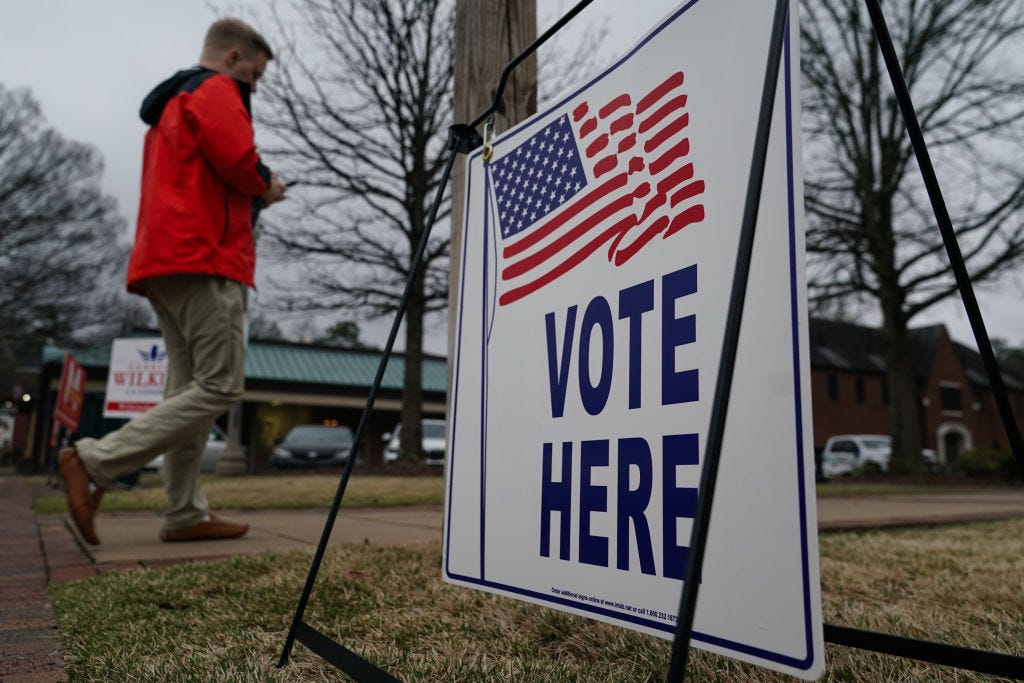|
 |
Election 2024: Top Down, Bottom Up
My experience as a poll worker confirmed my faith in our elections and in our community spirit
For 40 years, I have covered elections from the top down. I’ve spent the bulk of my career as a public opinion researcher at the American Enterprise Institute, whose “Election Watch” event series is the longest-running election analysis program in the country. I’ve spent my days poring over polling data, evaluating trends, working to understand what’s going on in Americans’ minds and looking at what’s driving their political opinions.
But on Election Day 2024, I decided to look at elections from the bottom up. This year, I signed up to be an election officer at my local precinct in Alexandria, Virginia—just outside of Washington, D.C. For months now, the major media has been keeping up an incessant drumbeat about expected widespread problems at voting locations on Election Day, and so I was interested to see for myself whether any evidence of this would crop up.
Our volunteer team of election officers—made up of Alexandria voters like me who had applied to work the polls on Election Day—had a few hours of training at city hall where we practiced on the machines we would use to check voters in. The city’s knowledgeable staff gave each of us a thick book about procedures at the polling place.
I skimmed the book and tried to absorb detailed information about everything from acceptable voter IDs (Virginia is one of 35 states that currently requires voters to present some form of identification in order to vote) to any array of potential polling place problems. Inside the book was a loose yellow piece of paper that said “Election Officer”—a placard to place inside our cars so we could park nearby all day and not get a parking ticket. I was impressed with the process and felt that I would be ready, with the help of more experienced volunteers, to take on the work.
All that was left was to wait for the big day to arrive.
On Election Day, our arrival time at the polling place, a local public school, was 4:45 a.m.—far in advance of the “polls open” time of 6 a.m. Around 20 volunteers showed up and were immediately put to work by a small team that had done it all before. It was clear that keeping the voting process streamlined and easy-to-understand was a top priority. We unloaded signs that would direct traffic throughout the day and attached them to walls and floors. We hung up sample ballots where people could view them before filling out the real thing. There was a constitutional amendment on our ballot, and we affixed a long description of it to another wall.
Inside the school gym, others were marching through additional tasks. Shrink-wrapped paper packets of ballots had to be counted to make sure each one contained 100. The check-in computers had to be set up, as did the machines that took voters’ completed ballots. The help desk, staffed by seasoned staff members, had to be organized so that voter issues could be resolved there. We put out the popular “I Voted” or “Future Voter” stickers. We took our oath as election officers, and the doors opened promptly at 6 a.m.
As election officers, we rotated throughout the day through a variety of positions—greeting people, checking them in, giving them their ballots, watching at a distance as they put their completed ballots into the machines—and each role came with a “script” from the book so we’d know just the information to communicate to voters. My initial assignment was the welcome desk, and with two other young women, I told people to have their IDs ready and pointed out the sample information, being careful not to say anything about the specific candidates on the ballot. Then we directed people to the check-in stations, where we electronically checked full names and addresses. Flags would appear on the screens if there was a problem for the voter. When that happened—and it did a few times—the voter was referred to the help desk. Some people weren’t properly registered. Several people were at the wrong polling place. But despite these hiccups, I didn’t see any serious problems at all—certainly nothing approaching widespread complications.
There were procedures for curbside voting for older or disabled people, and we used this several times during the day. Assistance was available for blind voters, too. Two people made sure that these individuals could vote privately and easily. Meanwhile, partisans campaigning on behalf of specific candidates stood outside, more than 40 feet away from our polling place, so voters coming to cast a ballot could avoid any electioneering if they chose to.
Not only did my experience as an election officer bolster my faith in our voting system, but it also cheered me up to see how many folks valued the work we were doing to ensure the election went smoothly at our polling place. Many people thanked us throughout the day. One woman got coffee for us election workers at the bakery two blocks away. Others brought donuts, snacks and even a plate of delicious egg salad sandwiches!
By the end of the day, almost 1,000 voters had come through our polling place. I assumed we could go home when the polls closed at 7 p.m. Naive me. We had to make sure the number of people we checked in matched the number of processed ballots exactly. All of the election materials had to be readied for city hall, and each of the volunteers had to sign three separate envelopes with those materials to ensure everything remained as secure as possible—and all of us would be accountable for the job we’d done. With all of us focused on making sure the election went off without a hitch, everyone seemed to work easily together. I went home exhausted at around 8:30 p.m. and started to get ready for my top-down analysis the next afternoon at Election Watch.
There has been much discussion about the waning of the American spirit of volunteerism in local communities. I don’t deny the numbers, which Robert Putnam first documented in “Bowling Alone,” but our precinct drew young and old volunteers, and I felt heartened by what I saw. There are polling places in America that have been dysfunctional for a long time, but I did not see any evidence of it in Alexandria.
Years ago, a mentor reminded me that America’s unbroken string of voting freely in quadrennial elections is a record unmatched anywhere in the world. I was proud to be a small part of America’s 60th quadrennial election, and I hope to be back again, even if we have to start at 4:45 a.m.
You’re currently a free subscriber to Discourse .

